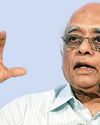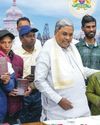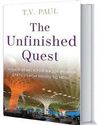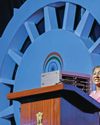
Shyam was only 31 when his heart stopped beating in November 2018.
A property broker and former high school volleyball player, Shyam had recently gained weight. During a workout one day, he felt short of breath and insisted that friends rush him to hospital. Minutes later, his pulse flat-lined.
He survived the heart attack, but the scar tissue that resulted cut his heart's pumping ability by a third. He couldn't pick up his children. He fell asleep every night wondering if he would wake up in the morning.
Desperation motivated Shyam to try for an unusual medical treatment: getting stem cells injected directly into his heart.
"I just trusted my doctors and the science behind it, and said, 'This is my only chance,"" he recalled.
Over the last decade, by studying stem cells in lab dishes, test animals and patients like Shyam, researchers have brought the promise of stem cell therapies closer to reality. The use of stem cells is part of a field called regenerative medicine, wherein a body's own cells and growth factors are deployed to repair tissues by restoring their lost function. Several cellular therapies and products have already been approved by regulators and are in use, including skin substitutes for treating burns, 'scaffold' products for healing surgical incisions and products derived from umbilical cord blood for treating certain blood diseases and disorders.
Stem cells broke into the public consciousness in the early 1990s, alluring for their potential to help the body beat back diseases of degeneration like Alzheimer's, and to grow new parts to treat conditions like spinal cord injuries. Progress has been slow. But researchers have been persistently learning how to best use stem cells, what types to use and how to deliver them to the body-findings that are not singularly transformational, but progressive and pragmatic.
This story is from the December 01, 2024 edition of THE WEEK India.
Start your 7-day Magzter GOLD free trial to access thousands of curated premium stories, and 9,000+ magazines and newspapers.
Already a subscriber ? Sign In
This story is from the December 01, 2024 edition of THE WEEK India.
Start your 7-day Magzter GOLD free trial to access thousands of curated premium stories, and 9,000+ magazines and newspapers.
Already a subscriber? Sign In

Why Trump covets Greenland
There’s no denying it. Donald Trump is a prince among real estate developers, known for his pushy, winner-takes-all approach.

Bomb man who kept his mouth shut
The best thing about Rajagopala Chidambaram, who passed away recently, was that he “could keep his mouth shut”, as his mentor Raja Ramanna wrote in his memoir, Years of Pilgrimage. No wonder, he tested six atom bombs with no CIA, ISI or satellite spy eyes getting any wiser beforehand.

Extreme to mainstream
With the recent surrender of six Naxals, Chief Minister Siddaramaiah declares Karnataka almost “Naxal-free”. The BJP is questioning his “closeness” to the far left

SUMMITS, SURVIVAL AND SERVICE
Mountaineering expeditions play a crucial role in mountain warfare training

EYES ON THE ICE
THE INDIAN ARMY TRAINS ITS MOUNTAIN WARRIORS AT THE MACHOI GLACIER WHERE THEY LEARN ICE AND SNOW CRAFT IN SUB-ZERO TEMPERATURES. THE HIGH ALTITUDE WARFARE SCHOOL IN GULMARG PREPARES THEM FOR WARS THAT ARE DRIVEN BY TECHNOLOGY AND INTELLIGENCE. ON SNOW-COVERED BATTLEFIELDS LIKE THE HIMALAYAS, THE ARMY WANTS ITS JUNIOR LEADERSHIP TO BECOME DECISION-MAKERS AT THE TACTICAL LEVEL

Time to dream big
Every year, January 12 is celebrated as National Youth Day—as homage to the birth anniversary of Swami Vivekananda, honouring his enduring teachings and visionary ideas.

Climbing the power ladder
In his latest book, T.V. Paul explores India's search for its day in the sun as a global power

Howdy, rowdies
The world is already exhausted, and Donald Trump has not even begun his second term.

The going gets rough
It’s been a very macho fortnight

Eastward Ho!
Odisha, which hosted this year's Pravasi Bharatiya Divas, is emerging as a focal point for India's Act East Policy, given the turmoil in the northeast